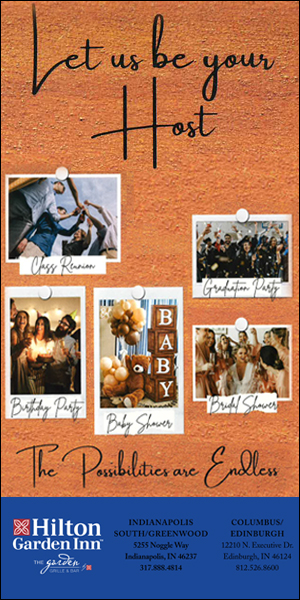
Regional soap makers offer good scents
By Nick Rassi
»In early America, people crafted soap by hand using lye from fire cinders, fat from farm animals and wildflowers or wild herbs. The process was messy and imprecise. Today, soap making has advanced, but one thing remains: Hoosier ingenuity. Some regional artisans have embraced the timeless craft and advanced its classic processes, giving Indiana a standout market for handmade soaps.
Daniels Creek Farm
Rose Brown of Peru happened into the business of soap making while seeking a remedy for her son’s illness. Her oldest child, Curtis, had been struggling to digest cow’s milk. Worried, Brown sought a solution. After a suggestion came from a friend to use goat’s milk as a substitute for cow’s milk, Brown and her husband, John, third-generation farmers, adopted and began milking dairy goats nine years ago. Soon the family had 27 goats on their farm.
The goat’s milk eased her son’s health issues, but the Brown family, drawing five gallons from each milking session, soon found themselves with too much milk on their hands. Brown began making soap.
Over the years, she has perfected her soap and essential oil combinations, and she now has a collection of many popular scents, like Ocean Breeze, Lavender and Orchard Rose. She has nabbed a spot on the Indiana Artisan list, a designation bestowed to craftspeople who create high-quality, Indiana-based goods.
You can find Daniels Creek Farm soaps around Indiana, including at Bear Hollow Wood Carvers in French Lick; Amboy Market in Amboy; Harvest Moon Foods in Rochester; The Herb Shop in Wabash; and at state parks, including Turkey Run, Brown County and the Potawatomi Inn. For more information, visit danielscreekfarm.com.
Body Eclectic Skin Care
Indianapolis-based soap maker Jess Walton became interested in plants and herbs as a young girl, when she recalls picking weeds to identify and categorize from the side of the road. In the late ’80s and early ’90s, she apprenticed with an herbalist and began collecting books and encyclopedias about different plant and herb species soon after.
Walton sees her craft as a marriage of art, science and magic, all combined in her double-milled soaps. She wants her soaps to inspire a “return to your own divine temple,” she says, and she lovingly describes her soaps as a practice of “celebrating your inside, your outside (and) emotionally, spiritually, physically, mentally taking care of yourself.”
Building on her love for plants and the body, Walton hopes to take this celebration further by opening an apothecary in Indianapolis. For now, though, she is entirely mobile, selling her wares at farmers markets, including the Noblesville and Irvington farmers markets, throughout the week and weekends. For more information, visit bodyeclecticskincare.com.
Soapy Soap Co.
Soapy Soap Co. founders Mohammed Mahdi and Anthony Duncan created their first product out of a simple necessity: They were out of soap. The Bloomington-based pair looked up a recipe and made a batch of soap, finding that they enjoyed the process. Faced with an excess, they sent a portion of their creation to their friends. Encouraged by the positive feedback, they began designing new recipes.
“When we take on a project, we dive in and submerge ourselves in all the available information: online resources, YouTube videos, rented books,” Mahdi says. Looking for a path less traveled in the soap world, the pair ditched the animal products in their soaps, opting instead to use sunflower oil.
Duncan, an Indiana University graduate with a degree in linguistics, named the soap line Sabun, an internationalism that means “soap” in many languages. They researched and tailored their Sabun line to accommodate a variety of skin types and needs, and the line’s popularity grew quickly. The young entrepreneurs soon found a home for their products on the shelves of central Indiana’s Fresh Thyme Markets and Whole Foods in Indianapolis. They also sell their products at the Columbus, Bloomington, Smithfield and Irvington farmers markets.
Duncan and Mahdi invite community members to come to their workshops to learn to make soap for themselves. They host tutorials on the first Sunday of every month. For more information, visit soapysoapcompany.com.
Curat Romania
Curat Romania handcrafted soaps started as a dream, a literal dream. Deep in the throes of REM sleep, Indianapolis-based makeup artist and hairstylist Misty Al-Eryani found herself in the kitchen of her late aunt, a soap maker from Tennessee. In the dream, Al-Eryani’s aunt told her to make soap to get through a difficult financial time. Not one to ignore advice, Al-Eryani founded her soap company, Curat Romania, in 2010.
Inspired by her Romanian friends’ aura of independence, Al-Eryani gave her fledgling company the Romanian name (“curat” is soap in the Romanian language) and endeavored to design her soaps for people with independent spirits. She initially sold her soaps at First Friday events in Indianapolis, where they were well-received.
“Every soap would sell out quickly,” Al-Eryani says. As her finances were aligning and the soaps continued to sell, she was featured in the local media.
As her products’ popularity grew, she began creating new lines. One of her favorite collections is Vodka Star, based entirely on vodka, which uses alcohol instead of water as a base. “Nobody else in the world makes soap with no water, just vodka,” says Al-Eryani. For more information, visit curatclean.bigcartel.com.
Herbal Art
When he moved to Indiana from North Carolina, Brian Paffen had trouble adapting to the Midwest’s harsh winters and hard water. He also didn’t know of anyone else making organic soaps in the state, so nearly 10 years ago, Paffen embarked on a mission to create superior body care products. Since then, he has developed his own process of crafting soap, using a hybrid of hot and cold press techniques, and creating a shea butter and honey-based formula for his soaps. Paffen describes both his soap base and all of his projects as “mellowly uplifting” that provide a mix of “relaxation and invigoration.” For more information, visit herbalartonline.com.
Get Lathered
Pharmacist Rhonda Frye started making soap as a hobby to keep her mind engaged. Once she understood the scientific processes behind soap making, she says she began exploring the artistic aspect of soap crafting in search of the most aesthetically pleasing results. She enjoys the challenge and complications of the delicate balance of oils and chemicals. “A large part of the draw (to soap making) is finding the right combination of oils to give the soaps the creamy texture that doesn’t dry out the skin,” she says.
With her products’ rising popularity, Frye has had trouble keeping up with the production demands, but she gets by with a little help from her friends, who assist her when the balance is too difficult. Despite the rising demand for her products, Frye plans to keep her production on a small scale. She currently sells her products on Etsy, at Homespun Modern Handmade and Twisted Sisters in Indianapolis, Gather in Bloomington and The Sterling Butterfly in Martinsville. For more information, visit etsy.com/shop/GetLathered.


